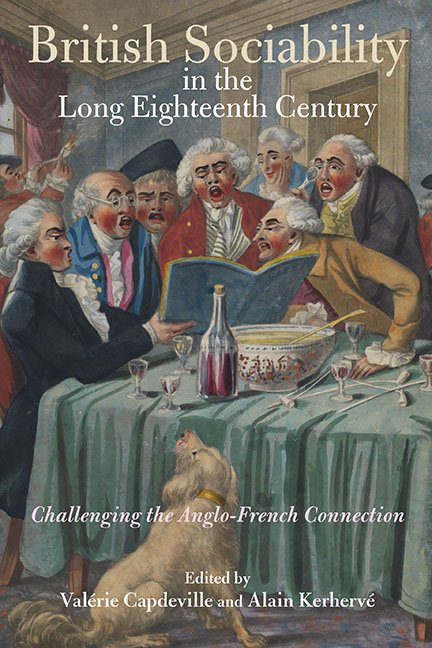Book contents
- Frontmatter
- Contents
- List of illustrations
- List of contributors
- Foreword
- Acknowledgements
- Introduction
- Part 1 Emergence of new political and social practices
- 1 ‘Restoration’ England and the history of sociability
- 2 Mapping sociability on Restoration townscapes
- 3 Club sociability and the emergence of new ‘sociable’ practices
- 4 The tea-table, women and gossip in early eighteenth-century Britain
- Part 2 Competing models of sociability
- Part 3 Paradoxes of British sociability
- Conclusion
- Bibliography
- Index
4 - The tea-table, women and gossip in early eighteenth-century Britain
from Part 1 - Emergence of new political and social practices
Published online by Cambridge University Press: 18 September 2019
- Frontmatter
- Contents
- List of illustrations
- List of contributors
- Foreword
- Acknowledgements
- Introduction
- Part 1 Emergence of new political and social practices
- 1 ‘Restoration’ England and the history of sociability
- 2 Mapping sociability on Restoration townscapes
- 3 Club sociability and the emergence of new ‘sociable’ practices
- 4 The tea-table, women and gossip in early eighteenth-century Britain
- Part 2 Competing models of sociability
- Part 3 Paradoxes of British sociability
- Conclusion
- Bibliography
- Index
Summary
THE TEA-TABLE is an object, an event and a concept. In the first iteration, the tea-table is a piece of furniture, a table on which the tea equipage is placed. The term also refers, in a second iteration, to the social gathering at which tea is consumed. It further identifies a third sense, the topic of this chapter: a new and hybrid form of polite sociability in the early eighteenth-century centred around the consumption of tea, that engages both women and men in a liminal zone between public and private spheres. The tea-table as event and concept is imbricated in practices of, and discourse about, talk and conversation. As a location for women's talk and conversation, the tea-table has been consistently identified with, or scapegoated by, gossip and scandal. Each of those aspects is closely embedded in the discourse of sociability as it was practised and understood in Britain in the early eighteenth century. In this sense, the tea-table makes an intriguing and largely under-researched contribution to debate about women's participation in the public sphere in this period. Resituating the tea-table within this debate further requires reconsideration of the discursive formation of gossip and scandal.
The context for tea-table sociability in Britain is the emergence in the late seventeenth century of the consumption of tea, the hot infusion of the oxidised and prepared leaves of Camellia sinensis. All tea consumed in Britain in this period was imported from China and Japan: it was in very limited supply and remarkably expensive. Tea drinking was at first especially associated with socialising amongst elite women at the royal court, and retained a symbolic connection with refinement and elite women even after its consumption became common. In this it differed from its main rival in the market for hot beverages, coffee, which, sourced from the Levant, had become almost ubiquitous in London and provincial cities by the 1670s, where it was closely associated with the public socialising of men in the coffeehouse. In the early decades of the eighteenth century, tea consumption rapidly expanded in Britain. Whereas in the seventeenth century tea had been mostly sourced through the Amsterdam sales of the Vereenigde Oost-Indische Compagnie (VOC), in the 1690s and after, increasing quantities were imported into Britain by the English East India Company (EIC), from Canton and other factory ports in China.
- Type
- Chapter
- Information
- British Sociability in the Long Eighteenth CenturyChallenging the Anglo-French Connection, pp. 69 - 88Publisher: Boydell & BrewerPrint publication year: 2019



